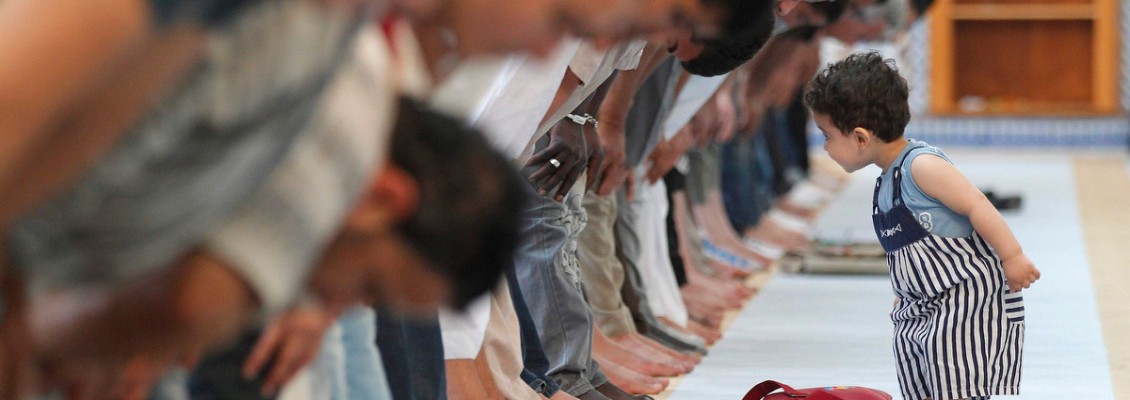
THE PROPHET AND CHILDREN
As a prophet who was sent to all humanity, we have clear
evidence that the Prophet Muhammad ﷺ believed children to be worthy of respect,
mercy and love. He showed great care in his relationship with all children, in addition
to his relationship with his own sons, daughters and grandchildren. Beautiful
details in the narrations of his moments with children were full of lessons for
the people around him at that time as well as for those of us reading about
them today. We are going to try to collect such moments in this article.
First of all, he was an affectionate father and did not
hesitate to express this affection, whether in public or in private. One of his
companions, Anas ibn Malik (RA) narrated the following: “I have never seen
anybody more compassionate than the Prophet toward one's family. His son,
Ibrahim, had a wet-nurse living in Awali, Madinah. He often went to see his son
with me. He would enter the blacksmith's house, which was full of smoke, took
Ibrahim and kissed him and smelled him; then, he would return." [Muslim,
Fadail, 63]
His bond with his youngest daughter Fatima, who lived the
longest of all his children, is also heart-melting. His delight at seeing her
was always apparent; he stood up to greet her, and complimented her generously.
He even gave up his seat for her. Fatima showed him the same manners and
kindness whenever her father visited her house. [Muslim, Fadail, 98]
When he was about to set out on a journey or a campaign,
Fatima was the last person he said goodbye to and the first person he saw on
his return. Even his wives came after Fatima. [Abu Dawud, Tarajjul, 21] His
love for his daughter was evident from his own words: “Fatima is a part of me.
What pleases her pleases me, and what saddens her, saddens me." [Bukhari,
Fadhail 12, 29, 31; Muslim, Fadhail 93-94]
The Prophet ﷺ was not shy to openly display his love for the
children of his family. Many narrations mention how he took his grandchildren
in his arms and showed them physical affection. One of these narrations informs
us that once Akra ibn Habis, the chief of a Bedouin tribe, saw the Prophet ﷺ
kissing his grandson Hasan and said, "Do you kiss your children? I have
ten and kissed none." This man found the actions of the Prophet ﷺ quite
strange due to his own character, which was harsh and stiff. The Prophet's ﷺ
answer to him was, "He who does not show mercy to others, will not be
shown mercy." [Bukhari, Tawheed, 2]
He did not care how odd this gentle and affectionate
behaviour looked to the people around him; his concern was for the children’s
preferences. He did not stop caring about children even while performing
prayers or delivering sermons. Sources inform us that once he came to the
mosque with his granddaughter Umama in his arms, and when he stood to pray, he
let the girl stay next to him. When he began to prostrate, the child climbed
onto his back, and the Prophet ﷺ extended the duration of his prostration to
allow her to stay longer on his back. [Bukhari, Fadail Al-Sahaba 22, Ilm 18:
Tirmidhi, Manaqib 9, Birr 57; Ibn Majah, Adab 3]
Together with his own children, the Prophet Muhammad ﷺ also
raised an adopted child with the same compassion he had towards his biological
children. This child was Zayd, who used to be a slave. Zayd was gifted to the
Prophet ﷺ as a child. The Prophet ﷺ later freed him and adopted him. After a
while, Zayd started to feel like a member of his household. The child's father
and uncle managed to track him down, and approached the Prophet ﷺ to ask for
his return. The Messenger of Allah ﷺ gave Zayd the right to make the decision
himself. Although one might have expected Zayd to want to return to his family,
Zayd said that he wanted to stay with the Prophet ﷺ; his exact words were,
"O Messenger of Allah, I would rather choose no one other than you."
[Tirmidhi, Manaqib 40]
As well as these examples of his affection towards his
family, the Prophet ﷺ did not have to know a child well to show them kindness.
He would make an effort to be compassionate towards any child. As soon as he
heard a child crying during prayer, for example, he chose to recite shorter
verses in order to shorten the prayer, to reduce the child’s distress and that
of their mother too. [Bukhari, Adab, 18; Muslim, Masajid 42] There is even a
narration about this in his own words: "I start the prayers with the
intention of extending them. However, when I hear the crying of a child at the
back, I keep the prayers brief to avoid making it harder both for the mother
and the child." [Bukhari, Adhan 65; Muslim, Salat 186, 192]

Leave a Comment